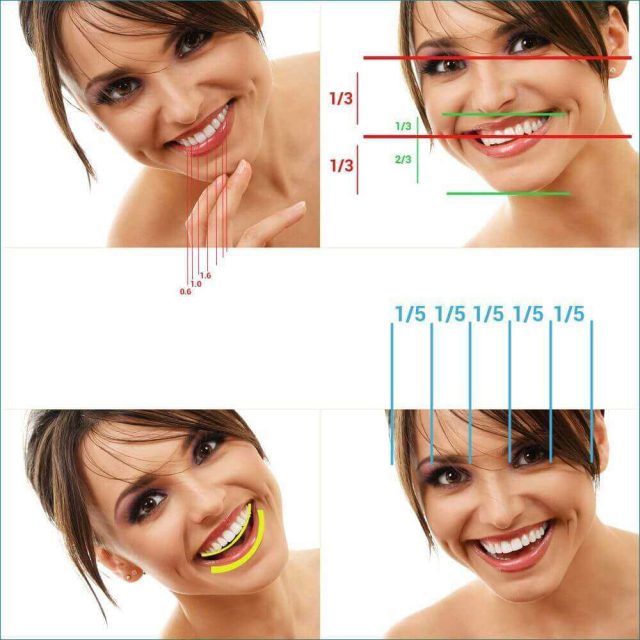Smile Design and Cosmetic Dentistry
A regular and systematic approach is required to evaluate, diagnose and figure out aesthetic problems. We pursue the ultimate goal of ensuring a good composition in a smile by combining various aesthetic components.
The smile that people can express many feelings with their teeth/lip structure and sign also determines how and how much functional they are in the community.
The emphasize attached on a good smile is not a recent trend. The search for beauty dates back to ancient civilizations. Both Phoenicians (B.C 800) and Etruscans (B.C 900) had carefully carved ivory to imitate the shape and tone of the natural teeth. Dentistry has not been regarded as a separate discipline until the 18th Century and it has not been known that it has been divided into different branches. The pioneer of the movement, French Pierre Fauchard (1678-1761), and his many colleagues have modernized and improved dentistry and advocated cosmetic procedures.
Objective of Smile Design
The purpose of cosmetic restoration is to develop a smooth chewing/mastication system in which all teeth, tissues, muscles, skeletal system and joints work in harmony. When treatment is planned for cosmetic dentistry cases, the smile design is so important that it cannot be separated from a comprehensive patient-oriented treatment. A successful, healthy and functional outcome requires understanding the relations between all supportive structures of the mouth, including muscles, bones, joints, gingival tissues and occlusion.
What Are The Components of An Aesthetic Smile?
An aesthetic smile requires the perfect integration of face and tooth composition. The facial composition includes hard and soft tissues of the face. The dental composition more particularly includes the relationship with teeth and gingival tissues. A smile design should always include the assessment and analysis of face and tooth composition.
From the front, the basic shape of the face can be one of the following:
Square – Narrow – Narrow square – Oval
When a person is viewed from the side, the profile can be any of the following:
Flat – Convex – Convex
These factors play a role in determining the tooth size, shape and side profile; In short, tooth morphology depends on facial morphology.


Vital Elements In The Design Of Smile (Dental Composition)

Vital elements of smile design include:
Those related to teeth;
- Median line
- The length of the incisors
- Tooth sizes
- Zenite points
- Axial inclinations
- Interdental contact area (ICA) and point (ICP)
- Incised embryo
- Gender, personality and age
- Symmetry and balance
Those related to soft tissue;
- Gum health
- Gingival levels and compliance
- Interdental embryo
- Laughter line
Tooth Visibility
When the mouth is opened comfortably and lightly, a younger individual should have an incisal third 3.5 mm portion of the maxillary forearm in the middle. As age progresses, a decrease in muscle tone causes fewer teeth to appear. Phonetics is an important determinant of tooth length. In phonetic exercises, the patient needs to sit upright or stand up to determine the proper lip, tongue, and cutting support and position of the tooth.
Tooth Sizes
The correct tooth profile is associated with facial morphology and is important in designing aesthetically pleasing smile. The proportions of the plants must be aesthetically and mathematically correct. The ratio of the widths to the lengths should be about 4/5 (0.8-1.0). The shape and position of the plants also affects the appearance and location of lateral and canine teeth. It is necessary to reach the correct proportions in aesthetically pleasing manner.
The buccal corridor is given to the dark space (negative space) that appears during smile between the mouth corners and the faces of the upper teeth facing the side. Appearance is shaped by these variables.
- Smile width and upper jaw
- Tonus of facial muscles
- Locations of the faces of the upper small shorelines
- The frontal appearance of the carnassial, especially the distal face line, and
- Any inconsistency between the values of small teeth and six front teeth
As a result, there is no formula for preliminary aesthetics; instead, the final aesthetic consists of a combination of the following elements.
- tooth profile guide lines
- the patient’s own sensation
- cultural and social impacts
- the artistic effects of the dentist
- effective communication with the laboratory
Soft Tissue Related Facilities
Gingival Health (gum health)
Since the gingiva serves as the framework of the teeth, the final aesthetic success of the case is greatly influenced by gingival health. It is very important that gum health is fully healed before any treatment begins. A healthy gum usually has the following characteristics.
- Pale pink color, orange peel image, solid and matte
- The facial surface is 3 mm above the alveolar bone level
- The interdental area (interdental space) should be terminated at the contact area 5 mm above the bone and should fill the gingival embryo.
Gingival level and compliance
Creating the right gingival levels for each tooth is the key role of a harmonic smile. The gum height (position and level) of the arts must be symmetrical. This level should also be matched with the canine teeth. It is acceptable that the side cuts have the same gingival level, but the gingival view closer to the cutting-edge plane makes the smile more pleasant and preferable. The least preferred form is that the sidecut gums are at the root level of the power plants and the canine teeth.
Essentials of Smile Design
Under the light of all these, the smile we created should be both appealing and functional in terms of aesthetics. It is our duty to evaluate, diagnose and get the best outcome for all our patients by taking all factors into account. We should be as conservative as possible when designing a laugh. Our aim should be to achieve the most aesthetic and durable result with the least reduction (removal) of the tooth structure. Cosmetic dentistry requires multidisciplinary work; if necessary, orthodontic, periodontal, surgical procedures can be applied.
